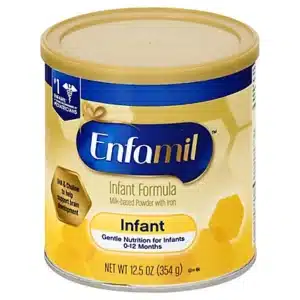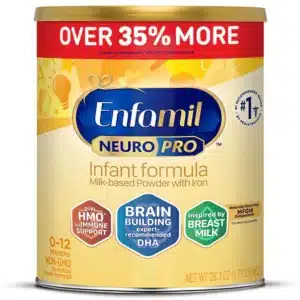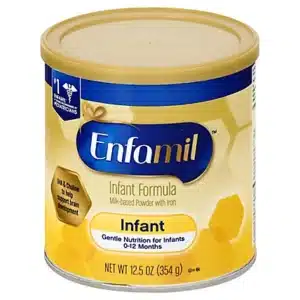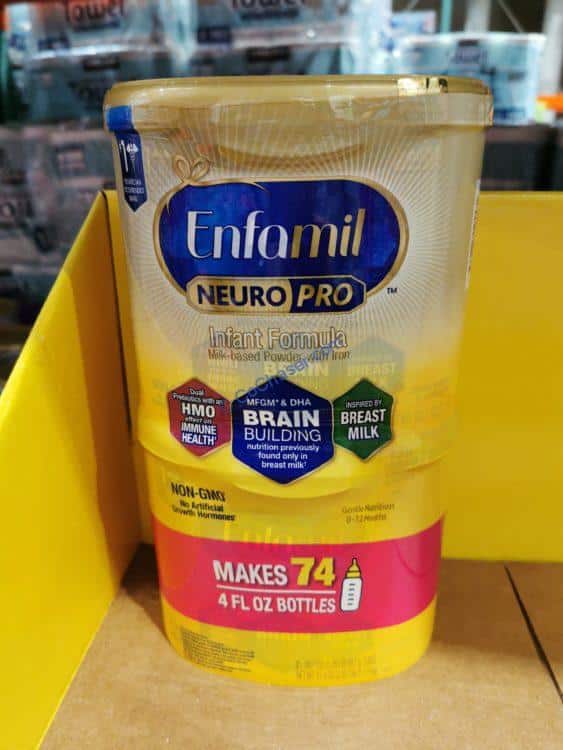Is Enfamil Neuropro The Same As Enfamil Infant?
Many factors can necessitate a parent to feed their baby infant formula instead of breast milk. Low milk supply, breast complications, a work schedule with little or no flexibility, etc. While breast milk is the best food for a baby, baby formula is the second-best recommended food for infants. But how do you go about picking the best formula for your baby? One that has the right nutrients in the right proportions?
About Enfamil

Enfamil is a popular and trusted brand when it comes to baby formula. The brand’s parent company, Mead Johnson, is a global company that focuses mainly on infant and child nutrition. The global company aims to be the world’s leading nutrition company for infants and young children by producing science and research-backed products. Mead John produces baby formulas (through Enfamil), supplements, vitamins, feeding accessories, etc.
There are different types of formulas from Enfamil, each tailored to a certain need or issue your child may have. It could be common allergies, fussiness, gas, or other things. The formula categories found on Enfamil’s official website include Allergies, Everyday Nutrition, Special Dietary Needs, and Tummy Troubles.
There has been a lot of confusion surrounding two key formulas in the Everyday Nutrition category; Enfamil Infant and Enfamil NeuroPro. What are they? Are they the same, or there’s a difference? Can you use them interchangeably? Let’s unravel the mystery.
Is Enfamil NeuroPro Same As Enfamil Infant?
Enfamil NeuroPro

Enfamil Infant

Although Enfamil NeuroPro shares a lot of components with Enfamil Infant, they are not entirely the same.
Enfamil Infant is a formula developed to suit the nutrition needs of infants below six months. Since the formula is made purposely for exclusively breastfed infants, it can be a great option to supplement breast milk. Enfamil Infant formula’s key ingredients are appropriate amounts of proteins, essential fatty acids like DHA (Docosahexaenoic acid), essential vitamins, and minerals needed for proper growth. DHA is a crucial element in improving cognitive development and vision.
On the other hand, Enfamil NeuroPro is made for children from 0 to 12 months. In addition to DHA, ARA (arachidonic acid), lactose, galactooligosaccharides (prebiotics), whey protein concentrate, nonfat milk, soy, high oleic safflower, and coconut oil, the formula contains MFGM.
Milk fat globule membrane (MFGM) is a naturally occurring substance in the human milk fat that makes Enfamil NeuroPro formula closely resembles breast milk. According to a study in the Journal of Pediatrics, giving babies formula with added bovine MFGM and lactoferrin helps improve their cognitive, language, and motor development. Enfamil Neuropro is the only infant formula that contains a fat-protein blend of Omega-3 DHA, omega-6 ARA, and MFGM.
Dr Musielak, a board-certified doctor in pediatrics, internal medicine, and obesity medicine at Ladue Internal Medicine and Pediatrics, says NeuroPro has a slightly higher composition of DHA and another omega-6 fatty acid, ARA (arachidonic acid).
He further said that although different formulas can serve the same purpose, parents should select formulas closely resembling human milk, like Enfamil Neuropro.
For this reason, Enfamil NeuroPro is different and better than Enfamil Enfamil Infant. Not because Enfamil Infant is a less superior product but because NeuroPro is closer to human milk than Enfamil Infant.
Choosing the Perfect Formula for Your Bab
Not all babies are the same. And while most babies do well on Enfamil Formulas, others may not. In this case, you may opt to look for other formula brands. But where do you start? What key things should you consider when buying infant formulas. Read on.
Before we look at choosing the right formula, it’s crucial to learn what formulas contain. Ingredients composition may differ, but generally, all baby formulas contain the following:
- Carbohydrates: most cow’s milk-based formulas contain lactose as the main carbohydrate. Other carbohydrates used in cow’s milk formula are glucose and sucrose.
- Protein: whey protein and casein are key proteins in cow’s milk formulas.
- Fat: cow’s milk formula consists of a special blend of vegetable oils, providing similar fatty acids as found in breast milk.
- Vitamins And Minerals: the American Academy of Pediatrics sets the guidelines on vitamins and minerals recommended for formulas. The Food and Drug administrations put forth the minimum and maximum of each vitamin and mineral that any baby formula should have.
- Probiotics and prebiotics: these two are not a necessity in baby formula, although some manufacturers add them. They help support your baby’s digestive tract immune system.
When buying baby formula, consider the following:
Child’s Nutritional Needs
Newborns and infants have special dietary needs and nutrient requirements that need to be met to ensure optimal growth and development. When picking formulas, select the ones with ample amounts of macronutrients like protein, fat, carbohydrate, and micronutrients like vitamins and minerals. Formulas containing other essential nutrients like DHA also improve vision and cognitive development.
Formula Variants
There are different formula variants in the market, and choosing one ideal for your baby is crucial. Powdered and concentrated formula preparations may be less convenient but are more cost-effective. At the same time, pre-made variants are convenient but fairly expensive. Premade variants may be a great choice for a hungrier baby, but powdered and concentrated variants are better.
Reasons For Formula Feeding
Depending on your reasons for wanting formula feeding instead of breastfeeding, you don’t need to be guilty. Formula feeding is equally recommended and a highly flexible and convenient way of meeting your child’s needs.
Holistic Infant Formulas
While infant formulas are great, they don’t equal breast milk. However, some formulas contain gut-boosting substances found in breast milk like pre and probiotics. Go for such formulas to help your baby build their resilience and immune system.
Consult Your Doctor
Lastly, consult your doctor before choosing your kid’s diet plan. Your family physician is in a better place to know what’s best for your child and family. So, let them know what you’re considering buying, and they’ll help you make a better-informed decision.
Conclusion
If you’re not able to breastfeed your child, formula feeding is equally a great way of meeting their nutrient demands. Enfamil Infant is good for introducing your infants to formulas (recommended for 0-6 months). However, Enfamil NeuroPro is better. It suits children from birth to one year and contains MFGM and higher levels of ARA and DHA, making it the closest milk to human milk.






